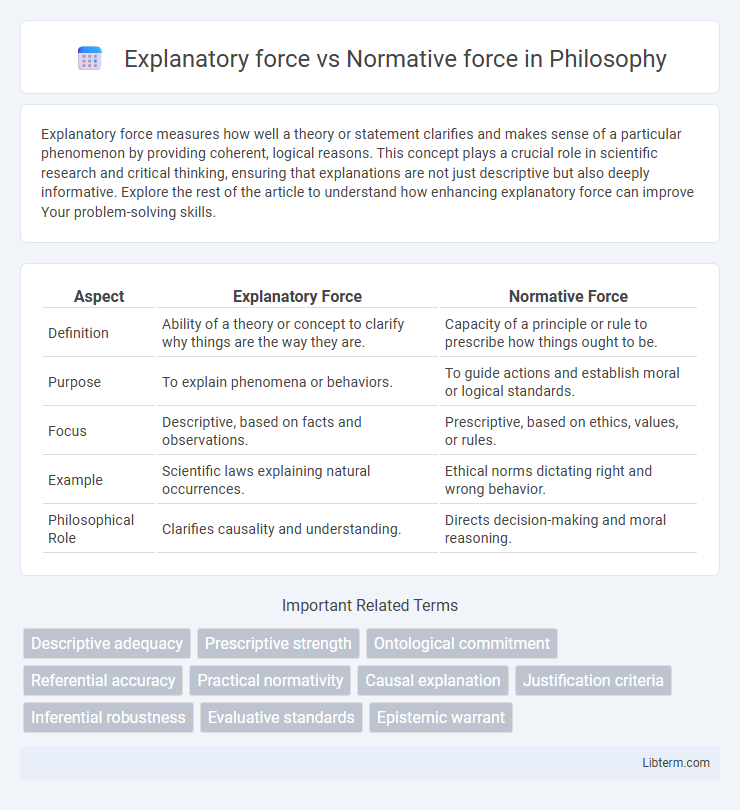Explanatory force measures how well a theory or statement clarifies and makes sense of a particular phenomenon by providing coherent, logical reasons. This concept plays a crucial role in scientific research and critical thinking, ensuring that explanations are not just descriptive but also deeply informative. Explore the rest of the article to understand how enhancing explanatory force can improve Your problem-solving skills.
Table of Comparison
| Aspect | Explanatory Force | Normative Force |
|---|---|---|
| Definition | Ability of a theory or concept to clarify why things are the way they are. | Capacity of a principle or rule to prescribe how things ought to be. |
| Purpose | To explain phenomena or behaviors. | To guide actions and establish moral or logical standards. |
| Focus | Descriptive, based on facts and observations. | Prescriptive, based on ethics, values, or rules. |
| Example | Scientific laws explaining natural occurrences. | Ethical norms dictating right and wrong behavior. |
| Philosophical Role | Clarifies causality and understanding. | Directs decision-making and moral reasoning. |
Understanding Explanatory Force
Explanatory force refers to the capacity of an argument, theory, or model to effectively clarify or make sense of a phenomenon by providing coherent reasons or causes. It enables deeper understanding by revealing underlying mechanisms and patterns that account for observed facts or behaviors, often measured through criteria like coherence, predictive power, and scope. Understanding explanatory force is crucial in fields such as philosophy of science, cognitive psychology, and epistemology, where distinguishing between mere description and genuine explanation impacts knowledge evaluation and development.
Defining Normative Force
Normative force refers to the compelling influence that principles, rules, or laws exert to guide or regulate behavior, establishing what ought to be done rather than merely explaining what happens. It embodies the authority behind moral or legal prescriptions, setting standards for action and justifying obligations. Unlike explanatory force, which clarifies why phenomena occur, normative force directs choices and enforces compliance within ethical, legal, or social frameworks.
Key Differences between Explanatory and Normative Force
Explanatory force pertains to the capacity of a concept or theory to clarify why phenomena occur, emphasizing causal relationships and factual understanding. Normative force involves the strength of a moral or ethical guideline that prescribes how individuals ought to act, focusing on values and duties. The key difference lies in explanatory force addressing descriptive facts, whereas normative force centers on evaluative judgments and obligations.
The Role of Explanatory Force in Philosophy
Explanatory force in philosophy refers to the capacity of a theory or argument to provide a coherent and comprehensive understanding of phenomena, helping to reveal underlying causes and mechanisms. It plays a crucial role in shaping philosophical inquiry by prioritizing clarity, coherence, and empirical adequacy over prescriptive guidelines or moral imperatives found in normative force. Philosophers leverage explanatory force to refine concepts, guide theory development, and evaluate the truthfulness and relevance of competing explanations within metaphysics, epistemology, and ethics.
The Importance of Normative Force in Ethics
Normative force in ethics shapes moral obligations by providing authoritative guidance on what individuals ought to do, rather than merely explaining behavior or beliefs. It establishes standards that influence decision-making and ethical judgment, reinforcing accountability and motivating moral action. The importance of normative force lies in its power to direct conduct and justify ethical principles beyond descriptive explanations.
Examples of Explanatory Force in Scientific Theories
Explanatory force in scientific theories is demonstrated by the ability to provide clear, coherent accounts of phenomena, such as Newton's law of universal gravitation explaining planetary motions through gravitational attraction. The theory of evolution by natural selection offers strong explanatory force by elucidating the diversity of species and adaptive traits over time. Quantum mechanics showcases explanatory power by accounting for the behavior of particles at atomic and subatomic scales, phenomena classical physics cannot explain.
Illustrations of Normative Force in Moral Reasoning
Normative force in moral reasoning manifests through principles like justice, fairness, and rights, which guide judgments about what ought to be done rather than merely explaining behavior. For example, Enlightenment thinkers emphasized normative forces by advocating universal human rights as binding moral standards. In contemporary ethics, normative force underpins frameworks such as Kantian deontology and utilitarianism, which prescribe actions based on intrinsic moral duties or consequences respectively.
Interactions between Explanatory and Normative Forces
Explanatory force reveals the underlying reasons behind phenomena, providing descriptive insights that clarify why events occur. Normative force, in contrast, prescribes standards or values that guide behavior and decision-making based on ethical or societal norms. Interactions between explanatory and normative forces enable a dynamic understanding where descriptive knowledge informs value judgments, and normative principles influence the interpretation and application of explanations in social, legal, and scientific contexts.
Evaluating Arguments: Explanatory vs Normative Criteria
Evaluating arguments involves distinguishing between explanatory force, which assesses how well an argument clarifies or accounts for observed phenomena, and normative force, which measures the argument's prescriptive power or adherence to ethical standards. Explanatory criteria prioritize coherence, empirical support, and causal relevance, while normative criteria emphasize moral principles, obligations, and value judgments. Effective argument evaluation balances these forces by ensuring explanations are both factually robust and aligned with normative frameworks.
Implications for Research and Practical Decision-Making
Explanatory force refers to the ability of a theory or model to account for and clarify observed phenomena, providing a foundation for understanding causal relationships and underlying mechanisms. Normative force influences research by guiding what should be studied or emphasized based on ethical, social, or practical values, shaping hypotheses and the framing of inquiries. In practical decision-making, balancing explanatory and normative forces ensures that interventions are both scientifically grounded and aligned with desired outcomes or moral considerations, enhancing the effectiveness and legitimacy of policies or actions.
Explanatory force Infographic

 libterm.com
libterm.com